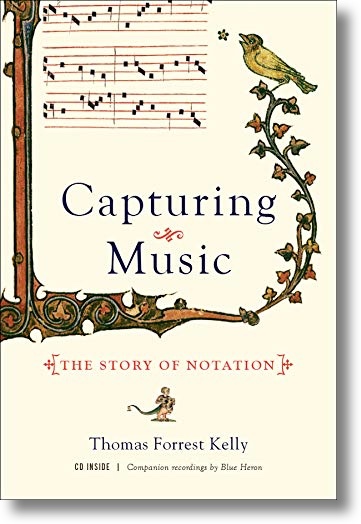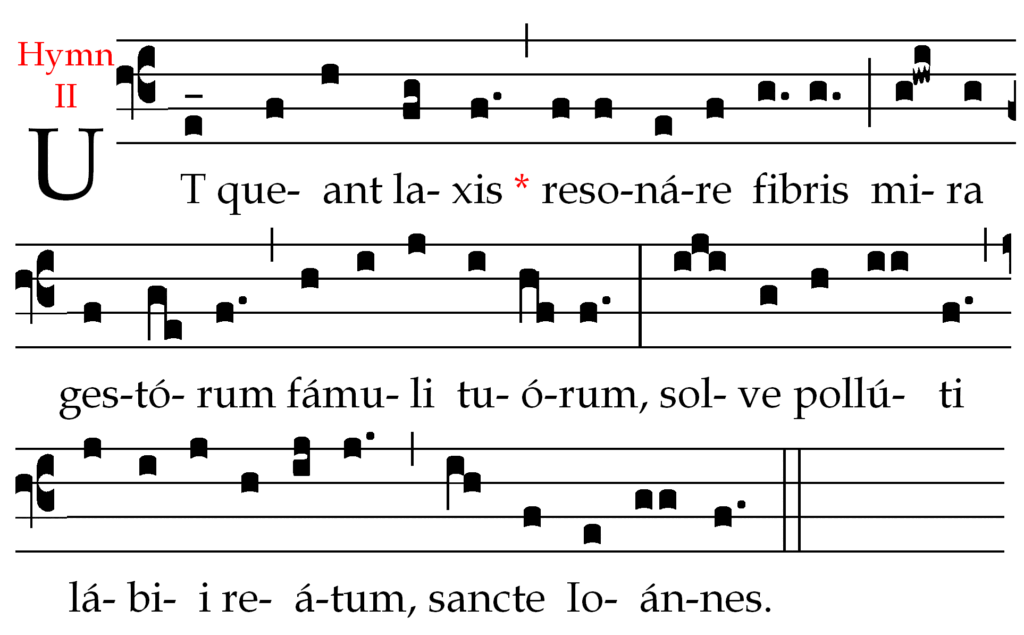
For most of human history, music was not “written down.” Music was an experience confined in time and space; there was no way to make a record of which notes should be sung when and how. One reason we don’t know how earlier forms of music sounded is because of the absence of adequate systems of notation. Beginning in the 11th century, systems for the recording of pitch and rhythm began to develop. In that development, the possibilities for musical composition and performance were transformed, as were the conception of what music is and the social placement of musical practices.
Thomas Forrest Kelly’s book Capturing Music: The Story of Notation (W. W. Norton, 2015) is a fascinating and wonderfully illustrated book about the earliest chapters in the history of musical notation. I had the pleasure of talking with him about his book not long after it was released. An edited version of that conversation was featured on volume 127 of the MARS HILL AUDIO Journal, and is presented here.
One of the heroes in the story of musical notation is an eleventh-century music theorist named Guido, a Benedictine monk in a monastery in Arezzo, Italy. Guido is credited with having invented the mechanism we know know as the musical staff: the grid of lines and spaces that signify the pitches of musical notes.
The modern staff has five lines, but the staves on which the earliest chants of the Church were recorded had only four lines. Below is a four-line staff with the notes and words for a hymn that has a prominent place on the story of notation:

As Thomas Forrest Kelly explained in his book, Guido not only came up with the idea of the musical staff, he “also gave the notes names that we still use.” Those are the names (slightly adjusted since Guido’s time) of the first seven notes of a musical scale we know as Do – Re – Mi- Fa – Sol – La -Ti.
Those syllables were not selected at random, but are from the Latin hymn pictured above. Ut queant laxis is a hymn in honor of John the Baptist, traditionally sung in the Divine Office on June 24, the Feast of the Nativity of John the Baptist. And, as Kelly explains, “has the remarkable feature that each of its first six phrases begins one note higher than the preceding phrase’s opening note. The six phrases begin with six notes, each successively higher — a six-note scale. Guido proposed calling each pitch by the syllable to which we sing it.”
As Kelly concludes: “UT RE MI FA SOL LA: six notes, six names, and with them you can fit just about any melody together. We still use those names, although modern euphony (Italian voice teachers, no doubt) has changed the first of them to ‘DO,’ which has nothing to do with the hymn but is easier to sing. That change allows us to use our own rhyme to remember the notes, in the words that Guido would have used if he’d lived in the twentieth century and been a fan of Rodgers and Hammerstein: “Doe, a deer, a female deer; Ray, a drop of golden sun. . . .”
Below is a recording of the entire hymn, chanted by the ensemble Blue Heron.
Ut queant laxis resonáre fibris
Mira gestórum fámuli tuórum,
Solve pollúti lábii reátum, Sancte Joánnes.
Núntius celso véniens Olýmpo
Te patri magnum fore nascitúrum,
Nomen, et vitae sériem geréndae
Ordinae promit.
Ille promíssi dúbius supérni,
Pérdidit promptae módulos loquélae:
Sed reformásti genitus perémptae
Organa vocis.
Ventris obstrúso récubans cubíli
Sénseras Regem thálamo manéntem:
Hinc parens nati méritis utérque Abdita pandit.
Sit decus Patri, genitaéque Proli
et tibi, compare utriúsque virtus,
Spíritus semper, Deus unus, omni
Témporis aevo. Amen.
O for your spirit, holy John, to chasten lips sin-polluted, fettered tongues to loosen; so by your children might your deeds of wonder meetly be chanted.
Lo! a swift herald, from the skies descending, bears to your father promise of your greatness; how he shall name you, what your future story, duly revealing.
Scarcely believing a message so transcendent, him for a season power of speech forsaketh, till, at your wondrous birth, again returneth, voice to the voiceless.
You, in your mother’s womb all darkly cradled, knew your great Monarch, biding in His chamber, whence the two parents, through their offspring’s merits, mysteries uttered.
Praise to the Father, to the Son begotten, and to the Spirit, equal power possessing, one God whose glory, through the lapse of ages, ever resounding. Amen.